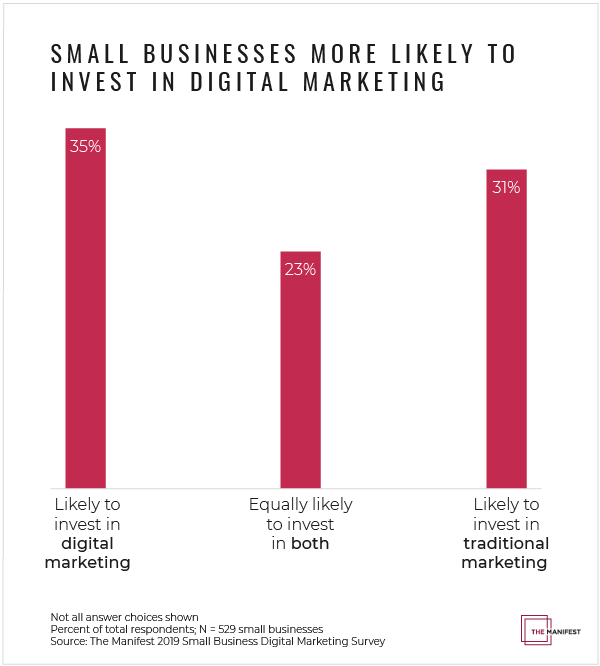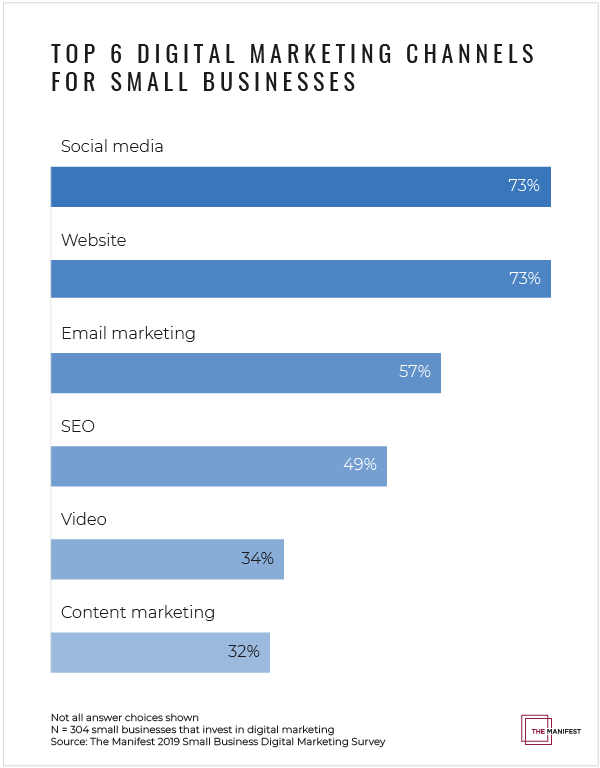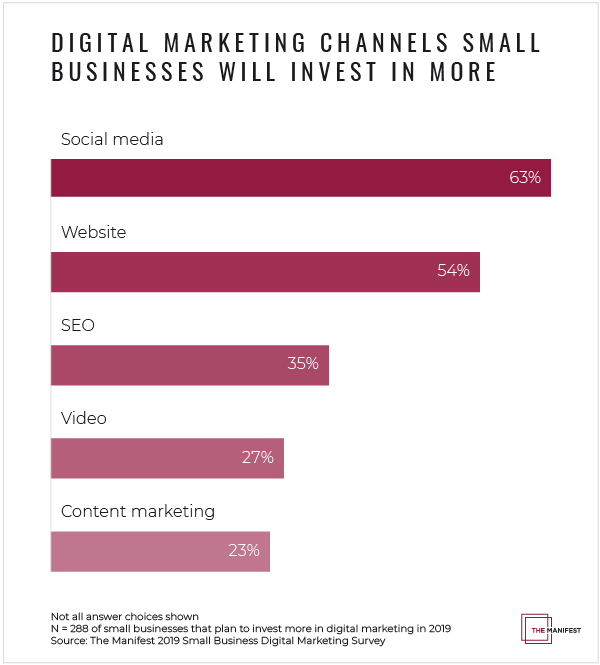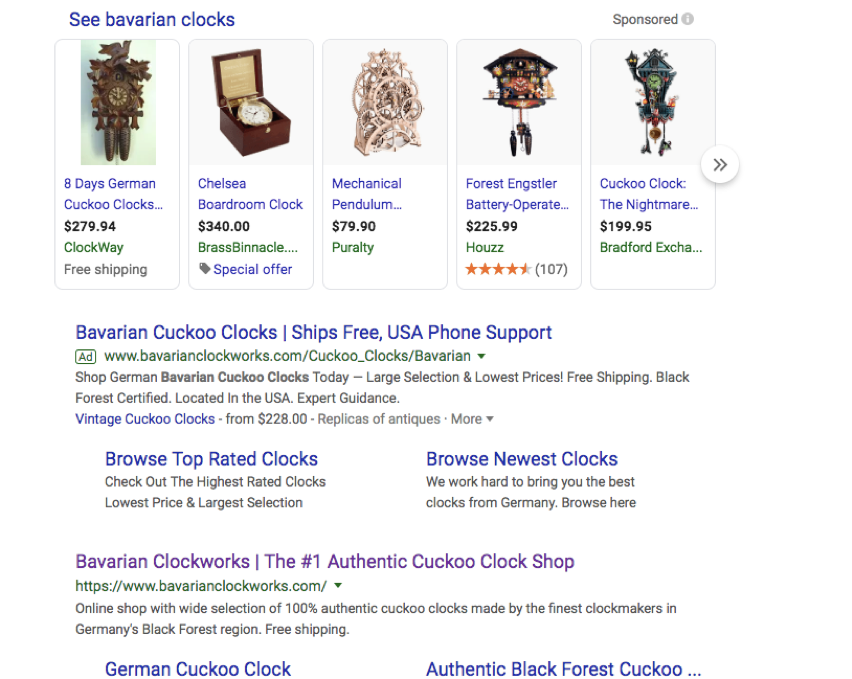How Small Businesses Use Digital Marketing Channels in 2019

How Small Businesses Use Digital Marketing Channels in 2019
Small businesses are increasing their investment in digital marketing as traditional marketing efforts trend down. Almost three-quarters of small businesses use social media as part of their digital marketing strategies to spread brand awareness and generate sales leads.
Digital marketing provides immediate value to small businesses looking to increase online traffic, engagement, and revenue.
By 2021, online shopping is projected to reach $4.8 trillion in revenue, which means small businesses have the opportunity to benefit from these consumer habits.
Small businesses can increase their profits by evaluating which digital marketing channels have the highest return on investment (ROI).
We surveyed 529 small businesses across the U.S. about the digital marketing channels they invest in, use, and prioritize.
We define small businesses as having limited revenue and between 1 and 500 employees, which aligns with the Small Business Administration’s definition of small business.
We discovered that small businesses heavily invest in digital marketing and prefer to focus on channels such as social media and their website. Use this article to learn how your small business can more efficiently invest in digital marketing channels.
Our Findings
- Almost all small businesses (89%) invest in marketing, which demonstrates the value of marketing efforts.
- More small businesses (35%) prefer digital marketing than traditional marketing (31%), as companies focus their efforts online.
- Nearly all small businesses (95%) will increase their spending on digital marketing in 2019, which indicates digital marketing is a high-return investment.
- The top channels small businesses will increase their investment in are social media (63%), website (54%), and SEO (35%).
- Almost three-quarters of small businesses (73%) invest in social media.
- Only around half of small businesses (49%) invest in SEO, suggesting small businesses do not find SEO as valuable as other digital marketing channels.
- About one-third of small businesses (34%) invest in video marketing, while only 27% plan to invest more; however, video marketing can be extremely lucrative for small businesses.
Small Businesses Value Digital Marketing Over Traditional Marketing
Small businesses continue to seek new methods of marketing as they focus their attention on promoting products and services.
Almost all small businesses (89%) invest in marketing, through either digital or traditional channels.

Traditional and digital marketing both have distinct benefits that can appeal to different businesses.
Traditional marketing involves print, billboard, direct mail, flyers, TV, or radio ads that easily reach large target audiences. Businesses can specify who sees their traditional marketing efforts by distributing and airing advertisements in certain areas and based on specific interest groups, such as who reads a magazine or watches a TV show.
Still, traditional marketing has become less mainstream due to cost and delay. While digital marketing has the advantage of sending at the click of a button, traditional marketing takes time to create and distribute.
Digital marketing has become extremely popular for small businesses. More than one-third (35%) of small businesses are more likely to invest in digital marketing than traditional marketing.

Meanwhile, 31% of small businesses prefer traditional marketing.
Digital marketing allows more direct interaction with consumers, as customers click advertisements and emails when they want to. Customers voluntarily engage with an ad, which demonstrates an initial level of interest.
Further, small businesses have the opportunity to target specific types of people based on location, interests, behavior, demographics, and connections. This targeting allows for better personalization, as ads can be directed to appeal to narrower groups.
It is also easy to track digital marketing efforts, as you can usually see who clicked on your ads and how frequently.
“I’m a big believer of always starting with digital first because it’s directly quantifiable, and you can turn it off like a light switch if it’s not working,” said Robert Weiss, president of MultiVision Digital, a New York video production company. “If you did that with a print or an advertising campaign, you need to commit to three or four months. You have no idea if it’s working or not working.”
I’m a big believer of always starting with digital first because it’s directly quantifiable, and you can turn it off like a light switch if it’s not working.
Weiss explains how digital marketing does not require a long-term investment. Small businesses can launch a campaign and quickly shut it down if the channel or strategy doesn’t appeal to audiences.
Traditional marketing, on the other hand, does not offer immediate feedback. Companies cannot simply “turn off” their radio or direct mail campaign. They must wait to see how audiences respond over time.
Digital marketing allows small businesses to evaluate the success of their campaigns in real-time and decide whether to adjust or cancel these efforts.
Social Media and Websites Top Small Business Digital Marketing Channels
Small businesses use digital marketing to promote their services across various channels -- all of which provide different benefits for their brand.
The top 6 digital marketing channels small businesses invest in are social media (73%), website (73%), email marketing (57%), SEO (49%), video (34%), and content marketing (32%).

Most small businesses find social media and their website to be the most valuable digital marketing channels. They prioritize these efforts over other channels such as SEO and video.
Surprisingly, fewer than a third of small businesses invest in content marketing, even though 78% of consumers prefer to learn about a company through articles over ads.
Small businesses should use a variety of channels to maximize their chances of success.
“Digital marketing offers versatility and the freedom to experiment,” digital marketer Dipti Parmar said. “There are tons of different channels like search [and] social media. Small businesses can spend a bit of money on each and quickly figure out which one works best for them.”
Digital marketing offers versatility and the freedom to experiment.
Digital marketing can increase user engagement and raise awareness about a business’s brand. Small businesses should take advantage of the ease and access of these digital marketing channels and promote their services from multiple platforms.
Small Businesses Are Increasing Their Digital Marketing Investment
Small businesses see the importance of digital marketing in an increasingly online-focused world.
Nearly all small businesses (95%) will increase their spending on digital marketing in 2019.

Approximately 80% of Americans shop online, which means the potential online market in the U.S. is roughly 264 million people.
Small businesses that may not have the same resources as enterprise companies can more successfully compete digitally than through expensive traditional marketing endeavors such as TV commercials.
Digital marketing offers a number of channels that small businesses can invest in successfully. Specifically, small businesses plan to increase spending in social media (63%), website (54%), and SEO (35%).

Only 27% of small businesses will increase spending in video, and 23% plan to invest more in content marketing.
Nearly all small businesses see the importance of digital marketing, although some channels are more popular than others. Thankfully, there are a variety of resources to make digital marketing easier.
Social Media Dominates Small Business Digital Marketing Strategies
Social media is most small businesses’ preferred method of digital marketing. Almost three-quarters of small businesses (73%) use social media marketing to promote their brand and services.

Social media marketing reaches a large audience easily and immediately. Small businesses can promote their products in a cost-effective manner that is easy to track.
“Without a doubt, social media marketing and advertising is our most successful digital marketing channel,” said Maria Kiagias of Social Gold Group, a marketing communications boutique. “Our team measures the success of our campaigns through strict analytics, campaign sales, and the human conversation surrounding the service, product, or brand.”
Social ads connect with Kiagias’ customers. People begin talking about her brand after seeing an advertisement on social media, and this draws more engagement to her channel.
For example, Social Gold Group uses its Facebook channel to share useful articles with its community.

Social media pages can indicate who is interested in your services and how to best relate to your audience – whether that means sending articles like Social Gold does or posting more interactive content such as videos.
The real-time tracking of social media also shows businesses the success of their campaign and if they should continue with it. The ROI is much easier to track than other marketing channels.
“You might find that not many customers convert via social media, but it works very well as a customer service channel for you,” Parmar said. “In such cases, it becomes difficult to attribute and measure the ROI from the channel. However, that doesn’t necessarily mean you shouldn’t have a presence on that channel.”
Although social media may not provide direct sales to a business, small businesses should still invest in this platform. Social media can strengthen your brand reputation, direct traffic to your site, and create a direct line of communication between your business and customers.
Small Businesses Will Increase Social Media Spending
Small businesses depend on social media marketing to generate brand awareness and increase traffic to their sites. Almost two-thirds (63%) will increase their investment in social media this year.

Although small businesses enjoy how cost-effective paid social media advertising can be, they also appreciate the free aspects of social platforms.
Facebook has more than 2 billion monthly active users, which means people form online communities to talk about interests and questions.
Small businesses can take advantage of these groups to promote their own products organically through customer conversation. For example, GreenPal, a lawn care service provider, uses social media to gain new customers.
“We monitor local [Facebook] groups, and when anyone is asking for a recommendation on a lawn care service, we kindly let them know about the GreenPal community,” said Zach Hendrix, co-founder of GreenPal.

Hendrix said that about 60% of the time that GreenPal recommends its services in a Facebook group, people sign up.
Hendrix immediately offers a solution to consumers; problems by addressing their needs with a comment. The ability to engage in a Facebook post from someone looking for a certain service provides immediate access to customers – and increases the likelihood that a customer will make a purchase.
Social media marketing allows small businesses to promote their services to a targeted audience and connect with them directly.
Only Half of Small Businesses Use SEO
The majority of small businesses do not recognize the value of search engine optimization (SEO).
Fewer than half of small businesses (49%) invest in SEO.

SEO can be extremely valuable to businesses that want to rank high in search results.
There are 5.6 billion Google searches every day, and more than half of all consumers say they prefer to shop online rather than in an actual store. However, 75% of people do not scroll past the first page of search results. This makes it essential for your business to be listed in the top 10 of Google search results.
SEO boosts a business’s visibility, which is essential because shoppers now prefer buying products online. Investing in SEO helps businesses gain more traffic and have a better ROI.
“SEO has proven to be fruitful because it isn't a one-off investment,” said Bob Ellis, owner of cuckoo clock marketplace Bavarian Clockworks. “The results are cumulative, so we are still getting an ROI from work that was done years ago. The main KPIs we track are traffic to the site each month and our keyword rankings in search engines such as Google and Bing.”
The results are cumulative, so we are still getting an ROI from work that was done years ago.
SEO provides a steady stream of traffic to Bavarian Clockworks, which increases its number of potential customers.

As Bavarian Clockworks shows, Google offers small businesses a chance to grow their audience and build a reputation for quality support.
Although Google dominates the search market, other search engines such as Bing and Yahoo! make up 33% of the desktop search engine market share. Many businesses, however, struggle to build a rate of return on their investment in Yahoo! and Bing.
Alexander Romanov, co-founder of iwillbuyhouse.com, a real estate investment business in Seattle, found it difficult to improve SEO for his site on Bing.
“We are not investing in Bing ads because over the course of last year, we generated a negative return on the investment, meaning that we spent more money on Bing Ads than what we earned from the leads that the channel generated,” Romanov said.
Google has a much larger share of the marketplace than Bing or Yahoo!, which means more people see your business’s ads on Google. Most small businesses would be smart to focus their SEO efforts on Google.
“We have seen the most conversion via Google AdWords,” said Ciara O’Dowd, a digital marketer for Simplify Valet Storage, a full-service storage company.
Ranking high in search results is essential for finding new customers and building trust with old ones. Although Google and Bing both offer potential benefits to small businesses, Google has a more advanced and nuanced system for ranking webpages.
SEO does not churn out immediate results because it takes time and continuous effort to rank in the top 10 search results.
The lack of immediacy may deter small businesses from investing in this valuable channel.
More small businesses should invest in SEO because SEO makes it easier for consumers to find your site. You may have an impressive portfolio, but if no one can find your work, it will never be recognized.
Small Businesses Should Prioritize Video Marketing
Video marketing is one of the most effective methods to engage viewers and explain more about what your product does.
Although 85% of the U.S. watches online videos every day, most small businesses do not actively invest in video marketing.
About one-third of small businesses (34%) currently invest in video marketing, and only 27% plan to increase spending on this channel this year.

The majority of small businesses fail to realize the potential benefits of video marketing for their business.
Adding a product video to your website’s landing page can increase customer conversions by up to 80%. A video provides a more engaging and entertaining way for customers to learn about your services instead of simply reading the product description.
Although creating a video involves time and money, many businesses benefit from video marketing. For example, startup consulting business MyCorporation finds that YouTube is its most profitable digital marketing channel.
“High-quality content takes time, money, and effort, but in the end, the results are worth every penny,” said Brittany Gamble, a social media specialist at MyCorporation.
High-quality content takes time, money, and effort, but in the end, the results are worth every penny.
Videos that can be shared on social media can create a buzz about your product and company, as it does with MyCorporation. Small businesses should invest in video marketing to create a more dynamic platform for consumers to interact with.
Below, MyCorporation offers a YouTube video that describes the differences between trademark, copyright, and a business name.

The video has more than 20,000 views, which demonstrates the value people gain from watching this content.
YouTube is a free and effective platform for businesses to post their videos and can help your website receive more traffic and brand recognition
“We find YouTube more personal and engaging than Facebook or Instagram,” said Matthew Ross, co-owner and chief operating officer of The Slumber Yard, an online mattress retailer. “We invest in creating our own [video] content as well to get in front of potential new viewers.”
The Slumber Yard’s YouTube channel has more than 16,000 subscribers.

The Slumber Yard actively creates videos to review mattresses and post news in a fun and relatable way.
By 2019, 80% of all web traffic will be from videos. Videos offer an easier way for consumers to understand information and a more engaging medium than text-based channels.
“Video [is] the king of all content because it drives every single business objective better than text or even images do,” Weiss of MultiVision Digital said. “Videos give the most amount of information in the shortest amount of time.”
Video [is] the king of all content because it drives every single business objective better than text or even images do.
Video marketing is an ideal channel for conveying information, especially when small businesses can actively interact with users online.
More than 34% of small businesses should focus on creating video content that can attract and engage viewers.
Small Businesses Rely on Digital Marketing for Traffic and Leads
Small businesses tend to value digital marketing over traditional marketing.
Digital marketing helps small businesses increase traffic to their website and consumer engagement with their products.
Almost all small businesses currently invest in digital marketing and plan to increase their investment in 2019. Small businesses clearly value digital marketing enough to continue spending money on creating new campaigns.
Nearly three-quarters of small businesses (73%) use social media marketing to create strong connections with their customers. Meanwhile, fewer than half of small businesses (49%) use SEO to rank higher in search results.
Video marketing continues to be an untapped resource for most small businesses, as only 34% of companies use videos to promote their products and services.
Small businesses invest in various channels to support their business efforts but are still missing out on valuable opportunities that can increase their customer base.
If you are unsure how to begin your digital marketing campaign, contact a digital marketing agency for help.
About the Survey
The Manifest surveyed 529 small business owners and managers across the U.S. Small businesses are defined as having between 1 and 500 employees and limited revenue.
More than half of small businesses (54%) have between 1 and 10 employees, and 46% have between 11 and 500 employees.
Most respondents are male (52%), and 48% are female.
Millennials make up 29% of respondents; 45% are Generation Xers, and 27% are baby boomers.
